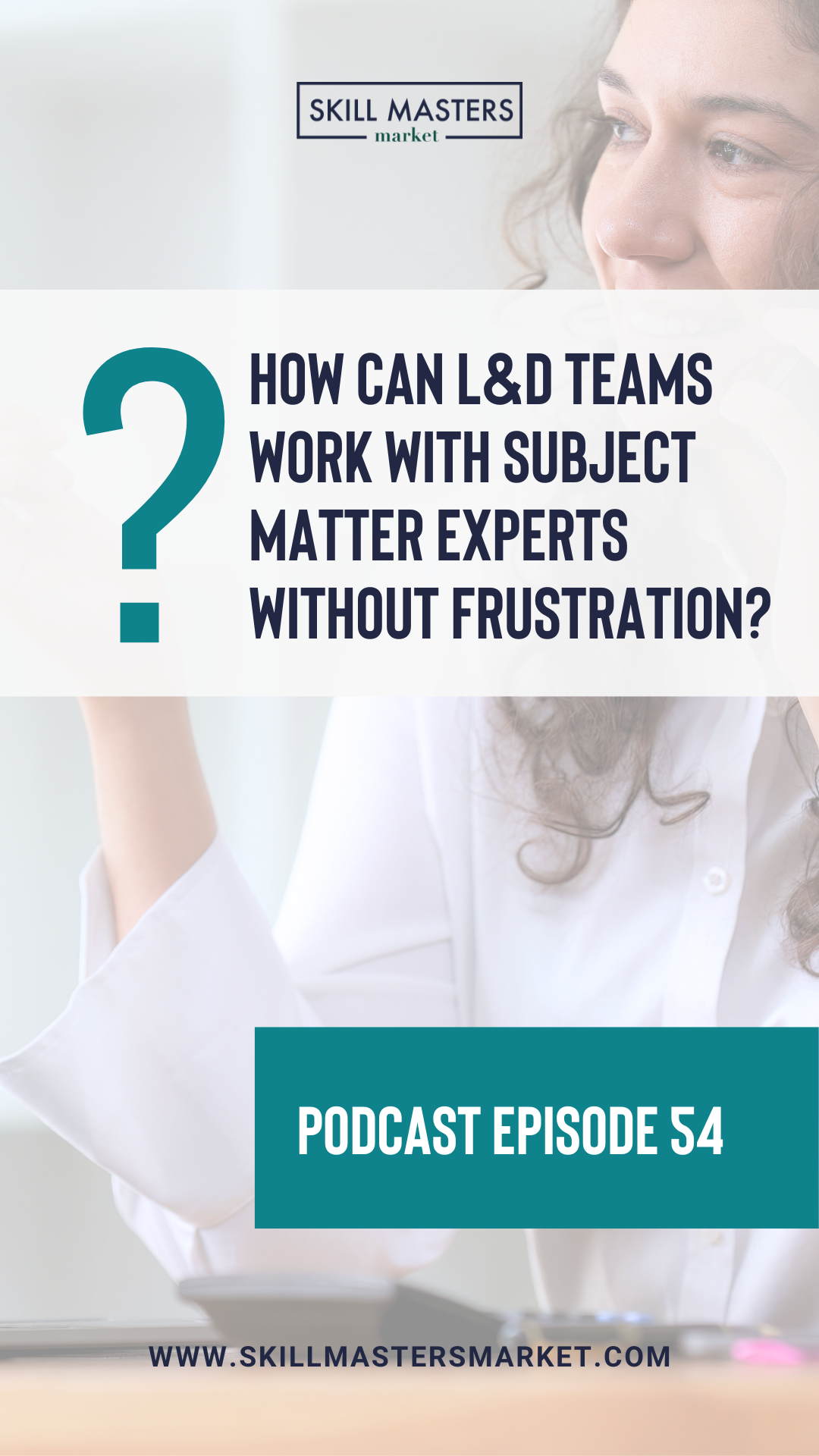How Can Learning and Development Teams Work with Subject Matter Experts Without Frustration?
Most subject matter experts are open to redesigning activities and interactions, but when you talk about cutting content, that can be a challenge because it feels personal.
So how do I navigate situations like these? And what can you do to navigate similar situations as you are working with your subject matter experts? I have three tips to share with you today
Listen to the episode or scroll down to read the blog post ↓
Key Points:
03:49 Establishing expectations upfront
05:15 Setting clear objectives
07:43 Aligning your deliverables with meetings
Click here to listen on Apple Podcasts. While you're there, subscribe to be the first to know about new episodes!
How Can Learning and Development Teams Work with Subject Matter Experts Without Frustration?
I consider myself fairly easy to get along with. I establish good relationships with my clients and I try to keep in touch with them long after our projects end because I care about them and about how things are going. And it was the same when I was working internally at a national nonprofit.
I worked with a lot of the same subject matter experts and internal partners time and time again. And I wanted to have good working relationships with each of them.
I wanted a relationship that was built on respect and trust both from a professional perspective and also on a personal level. So you could often find us talking about our kids, workouts, or upcoming travel plans with just as much connection and energy as when talking about competency models or learner needs.
But as with any relationship, we aren’t always going to agree.
So what happens when the Learning and Development Team disagrees with a subject matter expert?
Many times I have seen this lead to frustration. But it doesn't have to be that way. That's what I want to share on episode 54 of the podcast.
I was working with a client last year to revise and redesign an existing training to go from in-person training to virtual instructor-led training. We knew the course wouldn't be as long virtually as it was in person. So we would be faced with some decisions about how to cut content and how to create new activities and interactions to work in the virtual space.
As you can imagine, most subject matter experts are open to redesigning activities and interactions. However, when you talk about cutting content, that can be a challenge. And that's because subject matter experts are often passionate about the content. They are experts after all. And when we talk about cutting content, it feels personal.
So how did I navigate the situation? And what can you do to navigate similar situations as you are working with your subject matter experts?
In this blog post, I’m sharing three tips with you:
Establish role clarity for instructional designers and subject matter experts
Align training and development deliverables to project team meetings
These tips have worked well for me. But I will add that so much of this is also about the relationship. So while I don’t focus on relationship building in this episode, know that a good relationship with your subject matter experts will take you far.
1) Establish Role Clarity for Instructional Designers and Subject Matter Experts
Step One: Establish roles and expectations upfront.
You're going to want to start your project with a formal project kickoff every time. Even if you've worked with your subject matter expert before.
During the kickoff, you'll do all the things that you'd normally do in a kickoff like discussing the project and going over the timeline. But make sure during your project kickoff that you include a conversation about roles.
What is the Learning and Development team's role?
What is the subject matter expert's role?
How will you work together?
When will you work independently?
What are the expectations?
I always say that the subject matter expert's job is to look out for the content. And my job is to look out for the learner. The subject matter expert is an expert in the content. I am an expert in how adults learn. And together we can create something really amazing.
So, if there's a decision that impacts content, the subject matter expert should feel accountable. And if there's a decision that impacts the learner, the Learning and Development team should feel accountable.
Now, occasionally, there is a gray area here, specifically when we're talking about cutting content. So that's where tip two comes in.
2) Co-Create Learning Objectives for Your Training Programs
Tip Two: Set clear objectives and use them.
A lot of people will say that objectives fall clearly in the Learning and Development team’s realm. It is their responsibility. Part of their role in the project. And while I understand the thinking, it's important that the subject matter expert has buy-in with those objectives.
So my recommendation is to make this a discussion and co-create those objectives.
Here's how you're going to do the analysis that you need to do to understand the learner's needs.
1. Invite the subject matter expert to be as much a part of that process as you can, without biasing the results. Share the results with a subject matter expert and start a how might we conversation.
So for example, I might say, the analysis revealed that learners are struggling to observe their staff in action, and you've said that's essential to program success. How might we help them overcome those challenges?
Here’s another example. The analysis revealed that learners are already feeling really strong at communicating with families, and you've said they struggle with this. How can we bridge that gap?
2. Then take the needs analysis and your conversation with your subject matter expert and create a set of draft objectives. Present the draft to them in a way that invites discussion. Iterate on those objectives as you talk. And you're going to continue this as needed until you have a set of objectives that are aligned with your learner's needs.
What you discovered in the analysis process feels right to your subject matter expert, but also leverages instructional design best practices. Now you have a set of objectives that you both feel good about.
As discrepancies or disagreements come up around the content, you can go back to those objectives that you both created and have a discussion about the path forward. Because you both agreed on those objectives, the conversation goes smoother, you are both headed in the same direction, and you can make decisions based on those agreed-upon objectives.
3) Align Training and Development Deliverables to Project Team Meetings
Now, you might have noticed that a lot of this is based on having good discussions with your subject matter experts. That's what led me to tip three.
Tip Three: Align your deliverables with meetings.
This is so you can discuss and make decisions together. When you are communicating about potential disagreements via email, or via tracked changes in a Word document, it's easy to end up frustrated.
But when you are able to engage in a dialogue about their concerns and the issue at hand, you are more likely to get to a place where you can agree on an action.
That has been my experience. So I always align deliverables with meetings. Then we have the agenda for the meeting. We're going to talk about this review, this question, or this concern.
One-on-one, or whatever the project team size is, we're going to talk about this. We're going to work through it.
That is what's worked for me and I've been doing this for a long time. But I'm curious what has worked for you? How do you work with subject matter experts without the frustration? Come join us in the Nonprofit Learning and Development Collective and let us know what's working for you and for your Learning and Development team.
To hear the full conversation I had on the Learning for Good Podcast, scroll all the way up and tune into episode 54.
The Nonprofit Learning and Development Collective
Do you wish you could connect with other nonprofit learning and development leaders?
I know what it feels like to want someone to bounce ideas off of and to learn from, someone who really understands you and your work. Imagine if you could have a simple way to meet people in the field, ask questions, and share information.
That's why I created the Nonprofit Learning and Development Collective – so nonprofit L&D, talent management, and DEI leaders can connect with each other quickly and easily in a virtual space.
When you join this community, you will walk away with a new, diverse, and powerful network – and a sounding board for your staff development needs.
So if you're ready to exchange ideas and collaborate with your peers, come join the Nonprofit L&D Collective.




